Advertisements
Chapters
2: Shapes and Angles
3: How Many Squares?
4: Parts and Wholes
5: Does it Look the Same?
▶ 6: Be My Multiple, I'll be Your Factor
7: Can You See the Pattern?
8: Mapping Your Way
9: Boxes and Sketches
10: Tenths and Hundredths
11: Area and its Boundary
12: Smart Charts
13: Ways to Multiply and Divide
14: How Big? How Heavy?
![NCERT solutions for Math - Magic [English] Class 5 chapter 6 - Be My Multiple, I'll be Your Factor NCERT solutions for Math - Magic [English] Class 5 chapter 6 - Be My Multiple, I'll be Your Factor - Shaalaa.com](/images/math-magic-english-class-5_6:fbb96e68a84d44ecb5e1729fcc7e3bad.jpg)
Advertisements
Solutions for Chapter 6: Be My Multiple, I'll be Your Factor
Below listed, you can find solutions for Chapter 6 of CBSE NCERT for Math - Magic [English] Class 5.
NCERT solutions for Math - Magic [English] Class 5 6 Be My Multiple, I'll be Your Factor Be My Multiple, I'll be Your Factor [Pages 87 - 98]
The Mouse and the Cat
The steps on which the mouse jumps - ____________
The steps on which the cat jumps - ____________
The steps on which both the cat and the mouse jump - ____________
Can the mouse get away?
Find out
If the cat starts from the 5th step and jumps five steps at a time and the mouse starts from the 8th step and jumps four steps at a time, can the mouse get away?
Who is Monto waiting for?
Monto cat is waiting for somebody. Do you know for whom he is waiting? There is a trick to find out.
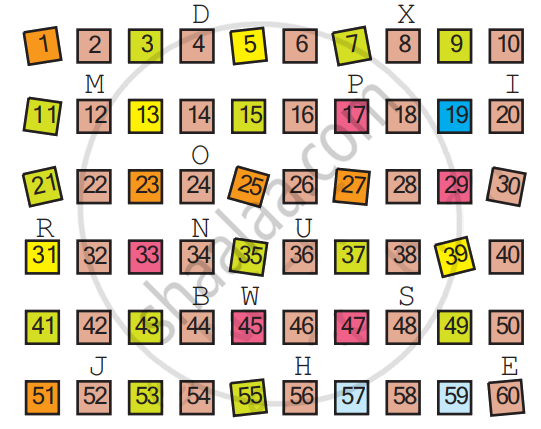
- Mark with a red dot all the numbers which can be divided by 2.
- Mark a yellow dot on the numbers which can be divided by 3 and a blue dot on the numbers which can be divided by 4.
- Which are the boxes which have dots of all three colours?
- What are the letters on top of those boxes?
- Write those letters below in order.
Meow Game
To play this game, everyone stands in a circle. One player calls out ‘one’. The next player says ‘two’ and so on. A player who has to call out 3 or a number that can be divided by 3 has to say ‘Meow’ instead of the number. One who forgets to say ‘Meow’ is out of the game. The last player left is the winner.
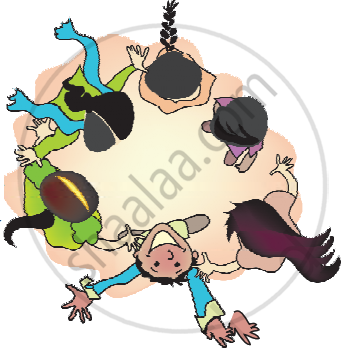
- Which numbers did you replace with ‘Meow’?
3, 6, 9 .........
We say these numbers are the multiples of 3.
Play the game by changing the number to 4.
- Now, which numbers did you replace with ‘Meow’?These numbers are the multiples of 4.
- Write any ten multiples of 5 ____________
Dice Game
Throw two dice together. What are the numbers that turn up on the faces of the dice? Make a two-digit number using them. If it is a multiple of any of the numbers written next to the circles, you can write it in that circle. Then it is your friend’s turn. The one who can write more numbers in 10 rounds is the winner.
Hint: I have 3 and 2 on my dice. If I make 23, it is not the multiple of any of the numbers. So I will make 32, which is a multiple of 4, and write it in the red circle.

Common Multiples
Think of a number. If it is a multiple of 3 write it in the red circle. If it is a multiple of 5 write it in the blue circle.
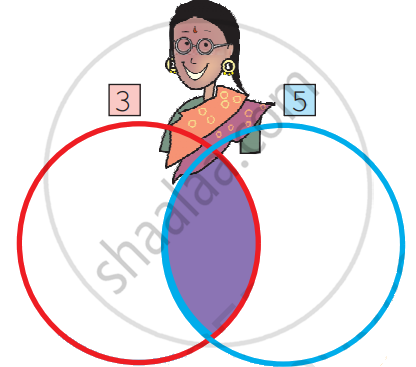
Some numbers are multiples of both 3 and 5.
So we can say that they are common to both 3 and 5.
Think! If you write the multiples common to 3 and 5 in the purple part, then will they still be in both the red and the blue circles?
- Which is the smallest among these common multiples? Repeat the game using the numbers 2 and 7.
- Write the common multiples of 2 and 7.
Repeat the game by putting the multiples of 4, 6, and 5 in the circles.
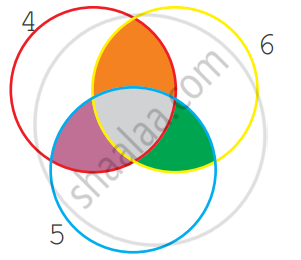
What common multiples of 5 and 6 did you write in the green part?
What common multiples of 4 and 6 are written in the orange part?
In which coloured part did you write the common multiples of 4, 6 and 5?
What is the smallest common multiple of 4, 6, and 5?
Puzzle
Tamarind Seeds
Sunita took some tamarind (imli) seeds. She made groups of five with them and found that one seed was leftover. She tried making groups of six and groups of four. Each time one seed was leftover. What is the smallest number of seeds that Sunita had?
More tamarind seeds
Ammini is arranging 12 tamarind seeds in the form of different rectangles. Try to make more rectangles like this using 12 tamarind seeds. How many different rectangles can you make?
If there are 15 tamarind seeds how many rectangles can you make?
Colouring the Grid
In the grid here, a rectangle made of 20 boxes is drawn.
The width of this rectangle is 2 boxes.
- What is its length?
Colour a rectangle made of 20 boxes in some other way.
What is the length and width of the rectangle you coloured?
In how many ways can you colour a rectangle of 20 boxes? Colour them all in the grid, and write the length and width of each rectangle you have coloured.
Bangles
There are 18 bangles on the rod. Meena is trying to group them. She can put them in groups of 2, 3, 6, 9, and 18 — without any bangle being left.
- How many groups will she have if she makes groups of 1 bangle each?
Now complete the table, for different numbers of bangles. For each number see what different groups can be made.
| Number of bangles | Different groups we can make |
| 18 | 1, 2, 3, 6, 9, 18 |
| 24 | 1, 2, .................... |
| 5 | |
| 9 | |
| 7 | |
| 2 | |
| 10 | |
| 1 | |
| 20 | |
| 13 | |
| 21 |
Fill the Chart
Complete the multiplication chart given here.

Look at the green boxes in the chart. These show how we can get 12 by multiplying different numbers.

12 = 4 × 3, so 12 is a multiple of both 4 and 3. 12 is also a multiple of 6 and 2, as well as 12 and 1. We say 1, 2, 3, 4, 6, 12 are factors of 12.
What are the factors of 10?
Can you do this from the chart?
What are the factors of 36?
Find out all the factors of 36 from the multiplication chart.
What is the biggest number for which you can find the factors from this chart?
What can you do for numbers bigger than that?
Common factors
Write the factors of 25 in the red circle and the factors of 35 in the blue circle.
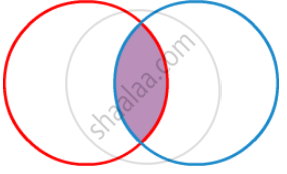
Which are the factors you have written in the common part (purple) of both circles? These are 25 and 35.
Now write the factors of 40 in the red circle and 60 in the blue circle.
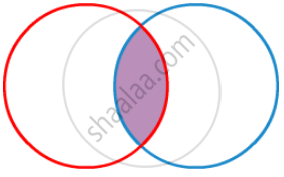
What are the factors written in the common part of the circle? Which is the biggest common factor of 40 and 60?
Factor Tree
Look at the factor tree. Now you can make another tree like this?
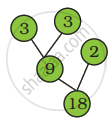
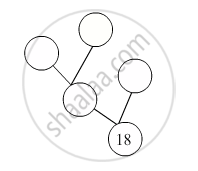
In how many ways can you draw a factor tree for 24? Draw three of them below.
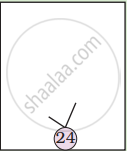
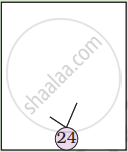
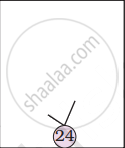
Try drawing the factor tree using other numbers also.
Tiling Problems
There is a garden in Anu’s house. In the middle of the garden there is a path. They decided to tile the path using tiles of length 2 feet, 3 feet and 5 feet.
The mason tiled the first row with 2 feet tiles, the second row with 3 feet tiles and the third row with 5 feet tiles. The mason has not cut any of the tiles. Then what is the shortest length of the path?
Manoj had made a new house. He wants to lay tiles on the floor. The size of the room is 9 feet × 12 feet. In the market, there are three kinds of square tiles: 1 foot × 1 foot, 2 feet × 2 feet and 3 feet × 3 feet. Which size of tile should he buy for his room, so that he can lay it without cutting?
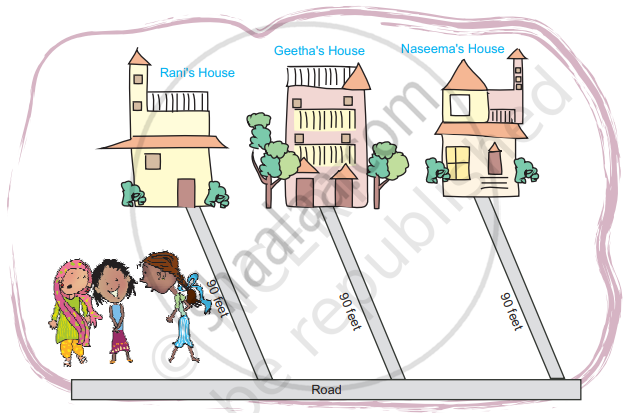
Rani, Geetha, and Naseema live near each other. The distance from their house to the road is 90 feet. They decided to tile the path to the road. They all bought tiles of different designs and lengths. Rani the shortest tile, Geetha bought the one and Naseema bought the longest one. If they could tile the path without cutting any of the tiles what is the size of the tiles each has bought? Suggest 3 different solutions. Explain how you get this answer.
Solutions for 6: Be My Multiple, I'll be Your Factor
![NCERT solutions for Math - Magic [English] Class 5 chapter 6 - Be My Multiple, I'll be Your Factor NCERT solutions for Math - Magic [English] Class 5 chapter 6 - Be My Multiple, I'll be Your Factor - Shaalaa.com](/images/math-magic-english-class-5_6:fbb96e68a84d44ecb5e1729fcc7e3bad.jpg)
NCERT solutions for Math - Magic [English] Class 5 chapter 6 - Be My Multiple, I'll be Your Factor
Shaalaa.com has the CBSE Mathematics Math - Magic [English] Class 5 CBSE solutions in a manner that help students grasp basic concepts better and faster. The detailed, step-by-step solutions will help you understand the concepts better and clarify any confusion. NCERT solutions for Mathematics Math - Magic [English] Class 5 CBSE 6 (Be My Multiple, I'll be Your Factor) include all questions with answers and detailed explanations. This will clear students' doubts about questions and improve their application skills while preparing for board exams.
Further, we at Shaalaa.com provide such solutions so students can prepare for written exams. NCERT textbook solutions can be a core help for self-study and provide excellent self-help guidance for students.
Concepts covered in Math - Magic [English] Class 5 chapter 6 Be My Multiple, I'll be Your Factor are Factors and Multiples, Tests for Divisibility of Numbers, Divisibility by 2, Divisibility by 3, Divisibility by 4, Divisibility by 5, Some More Divisibility Rules, Common Factor, Common Multiples, Highest Common Factor, Lowest Common Multiple, Arranging the Objects in Rows and Columns, Prime Factorisation.
Using NCERT Math - Magic [English] Class 5 solutions Be My Multiple, I'll be Your Factor exercise by students is an easy way to prepare for the exams, as they involve solutions arranged chapter-wise and also page-wise. The questions involved in NCERT Solutions are essential questions that can be asked in the final exam. Maximum CBSE Math - Magic [English] Class 5 students prefer NCERT Textbook Solutions to score more in exams.
Get the free view of Chapter 6, Be My Multiple, I'll be Your Factor Math - Magic [English] Class 5 additional questions for Mathematics Math - Magic [English] Class 5 CBSE, and you can use Shaalaa.com to keep it handy for your exam preparation.
